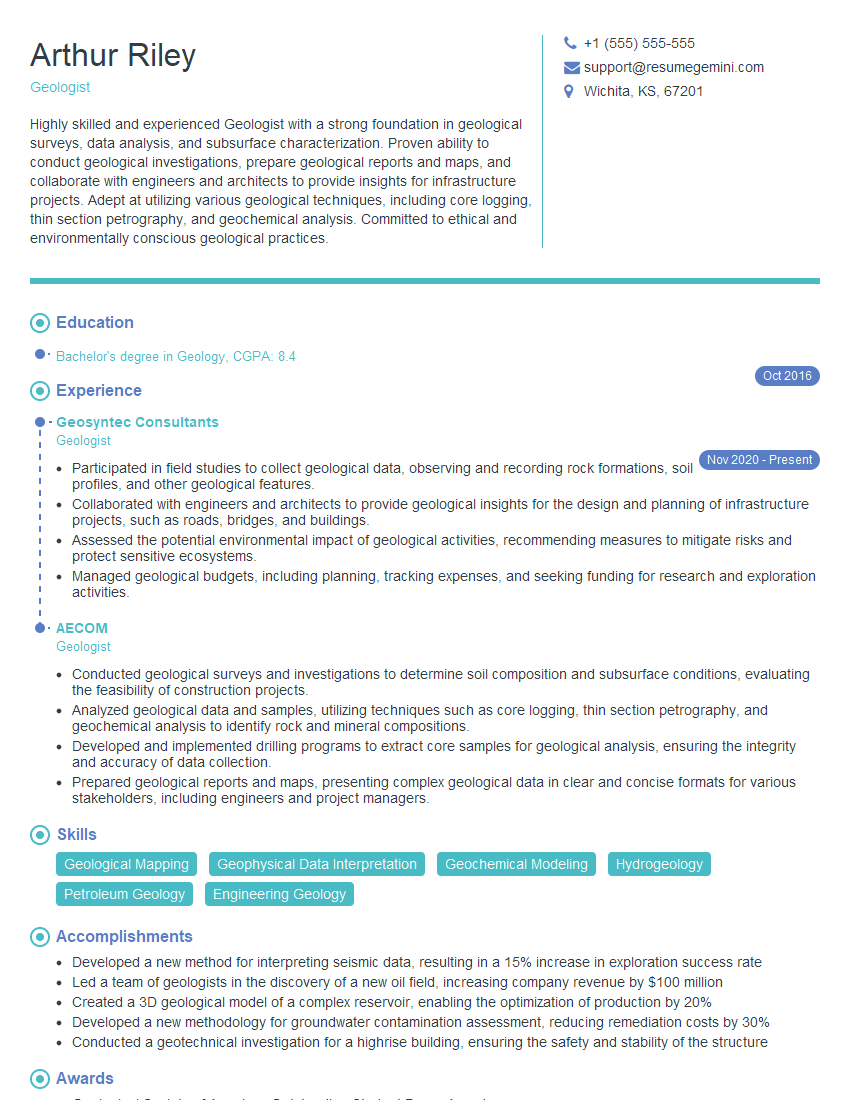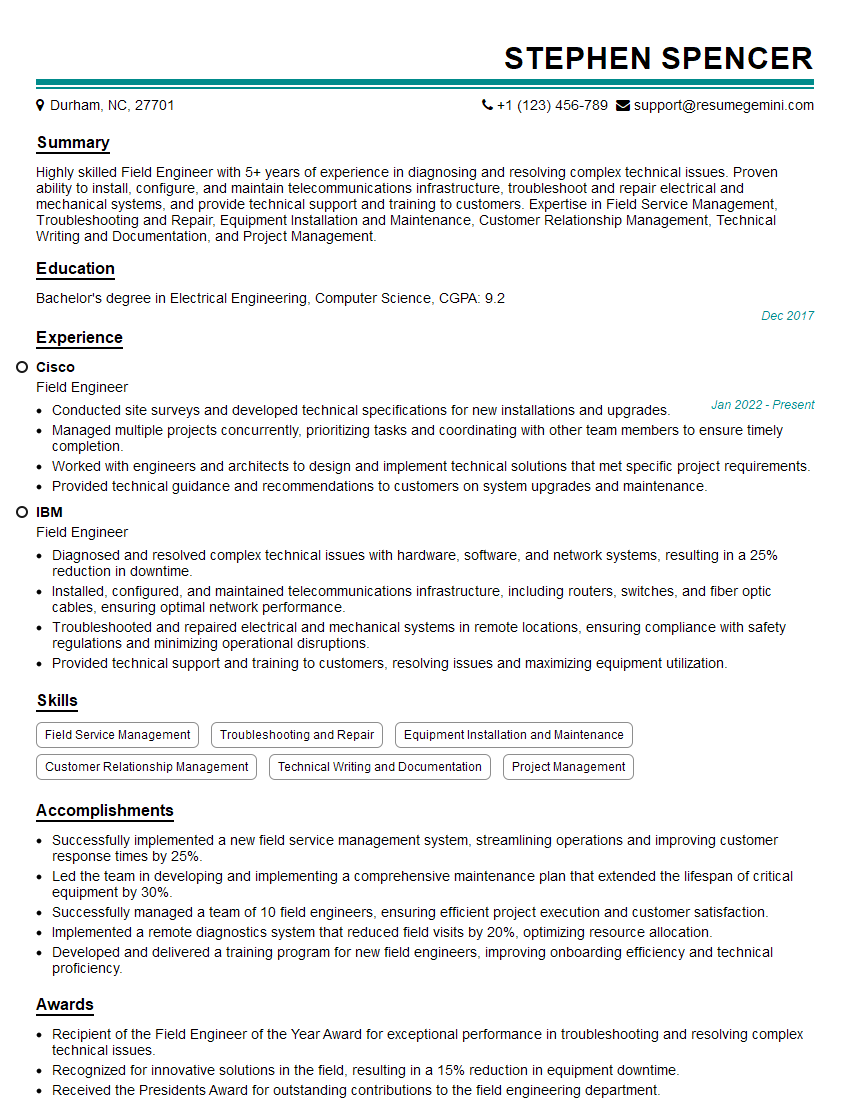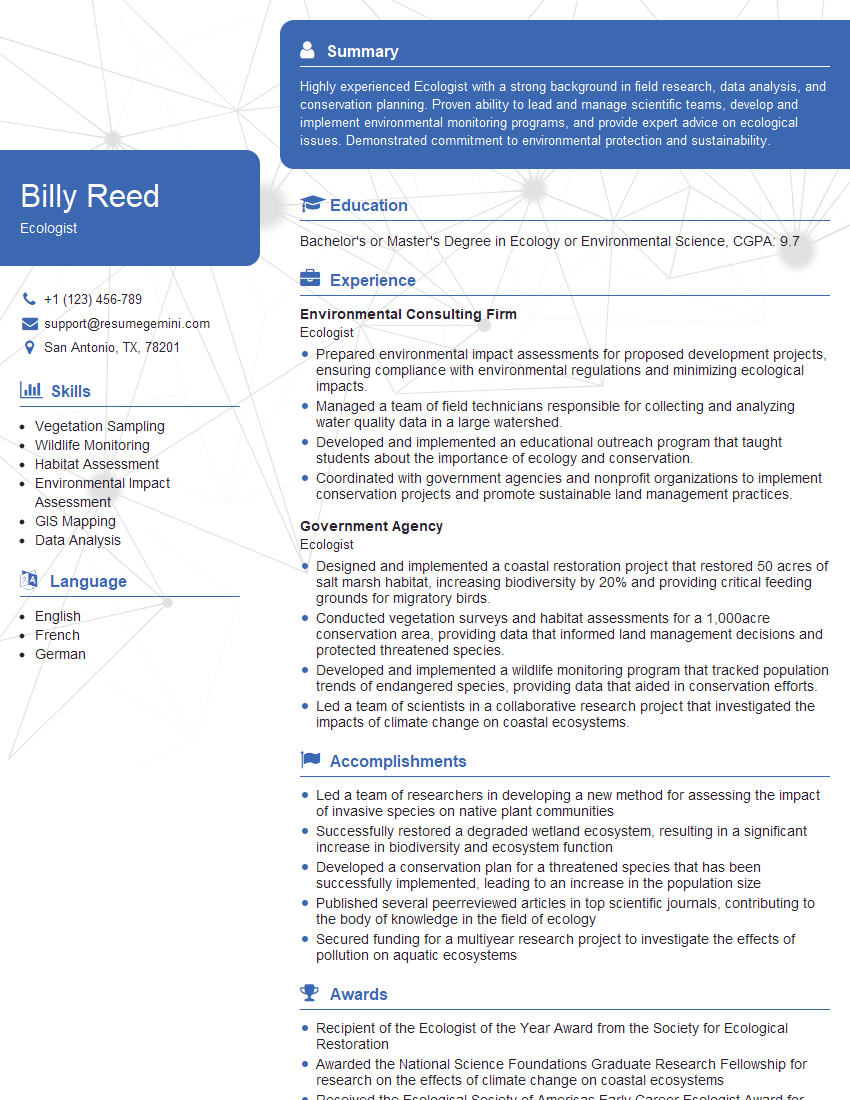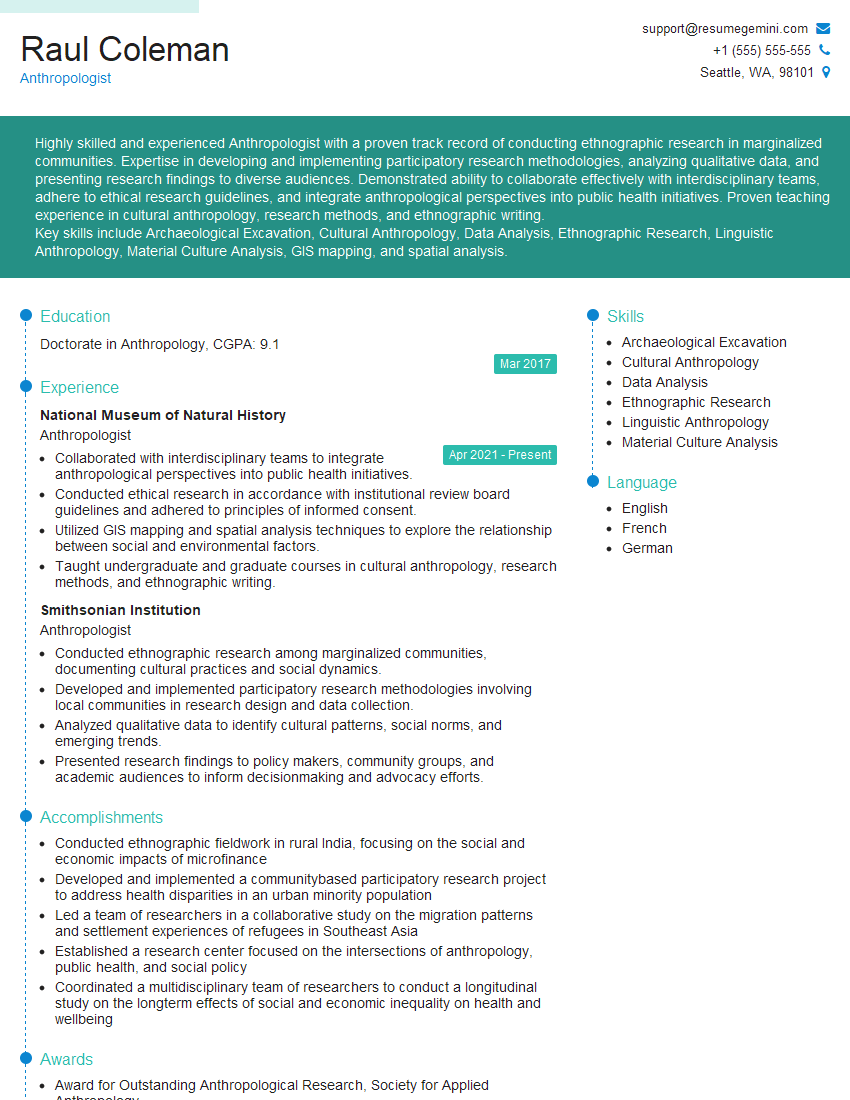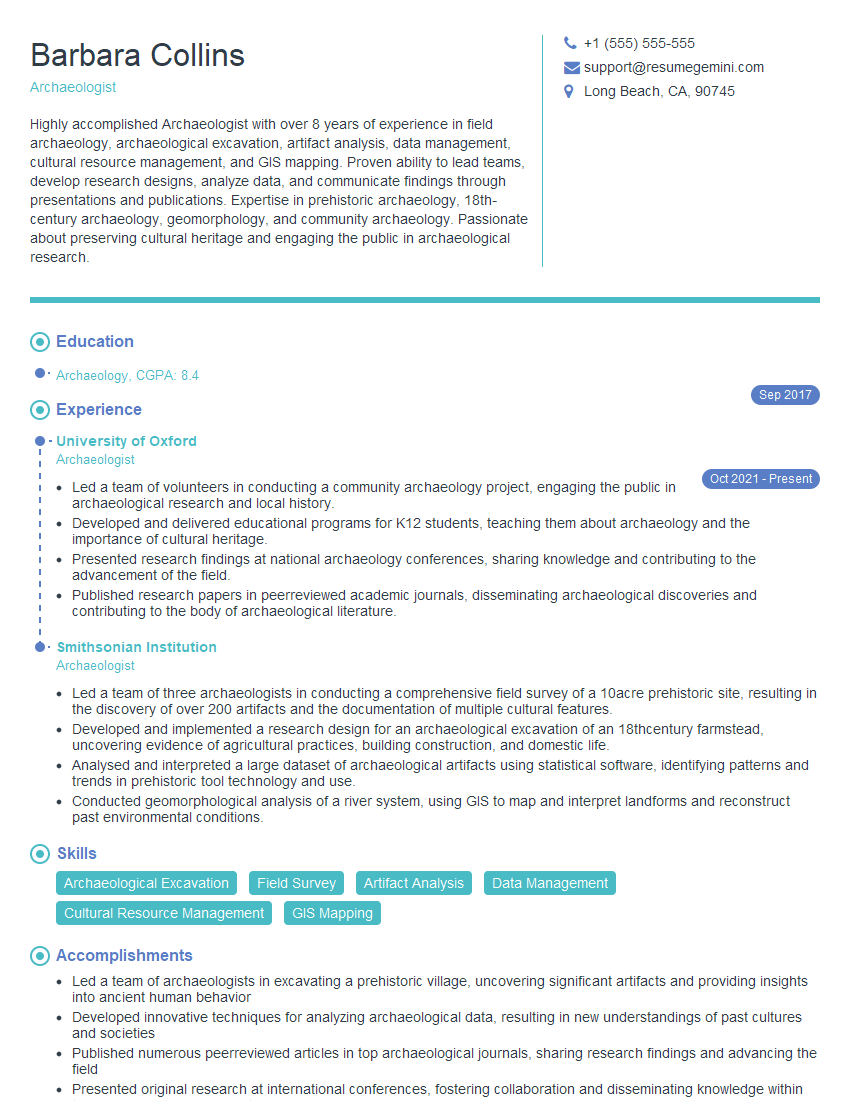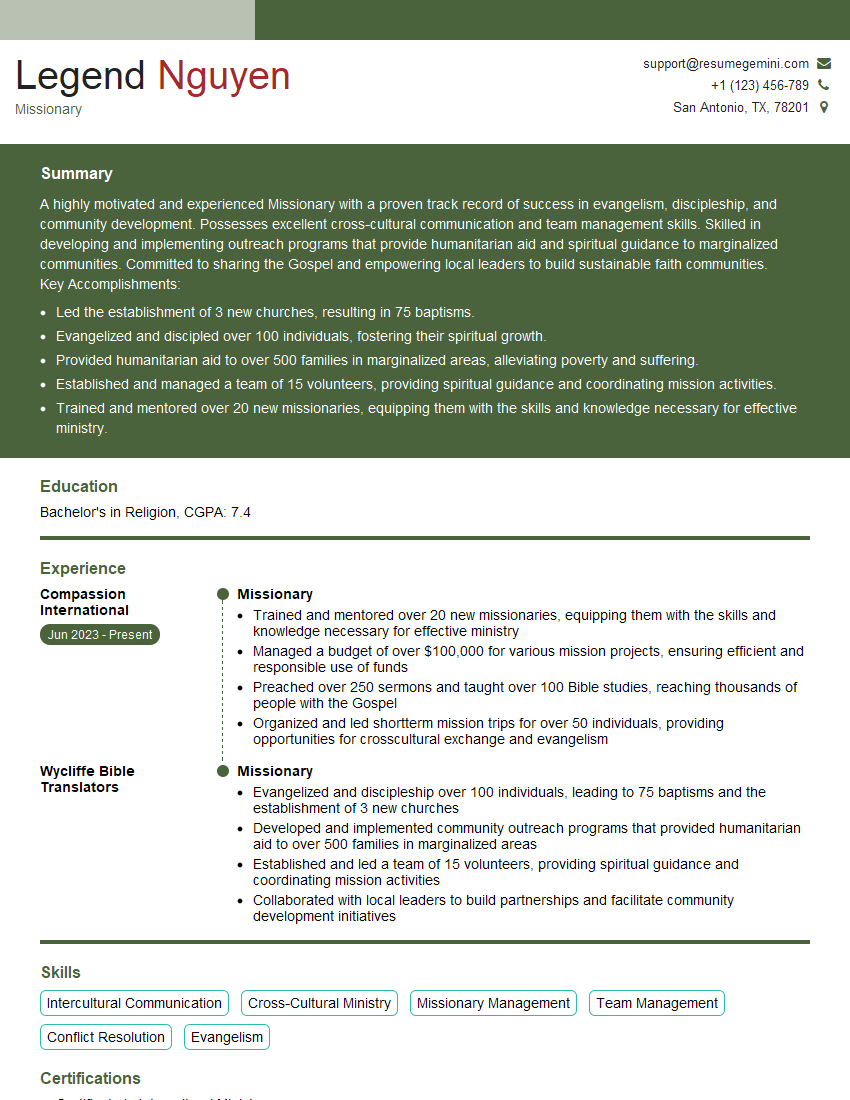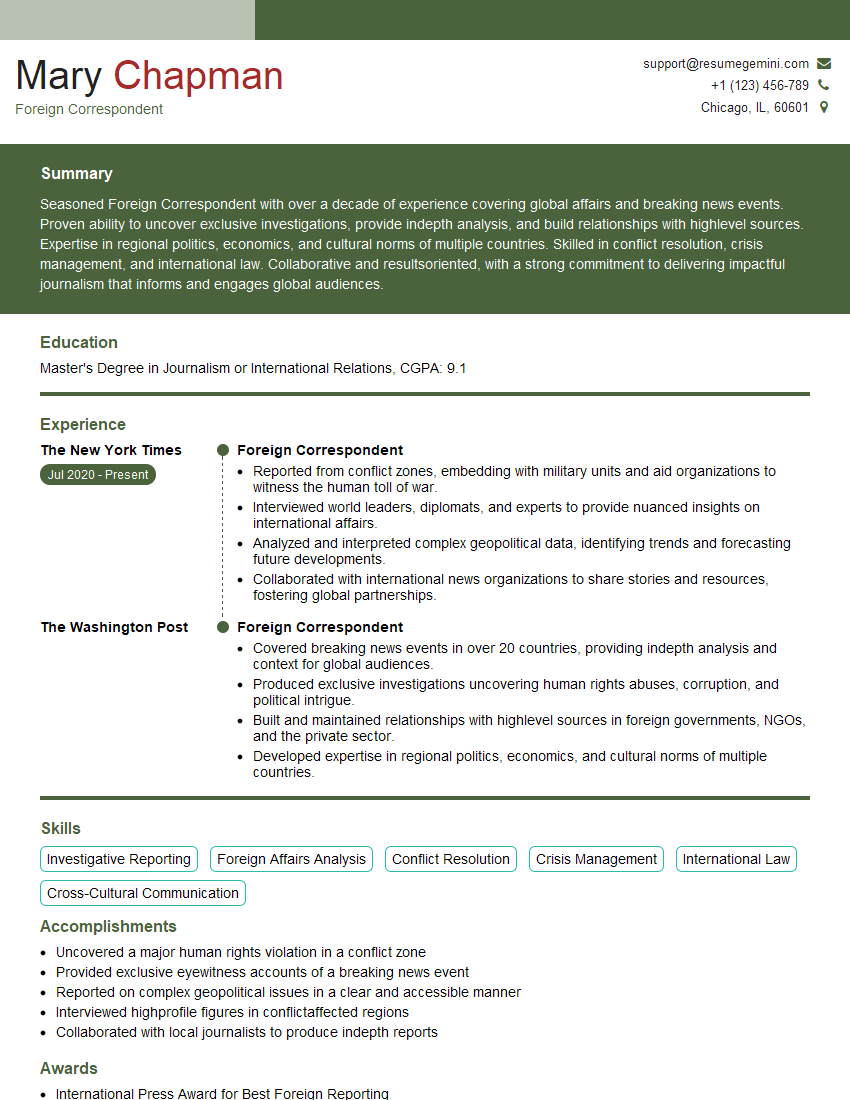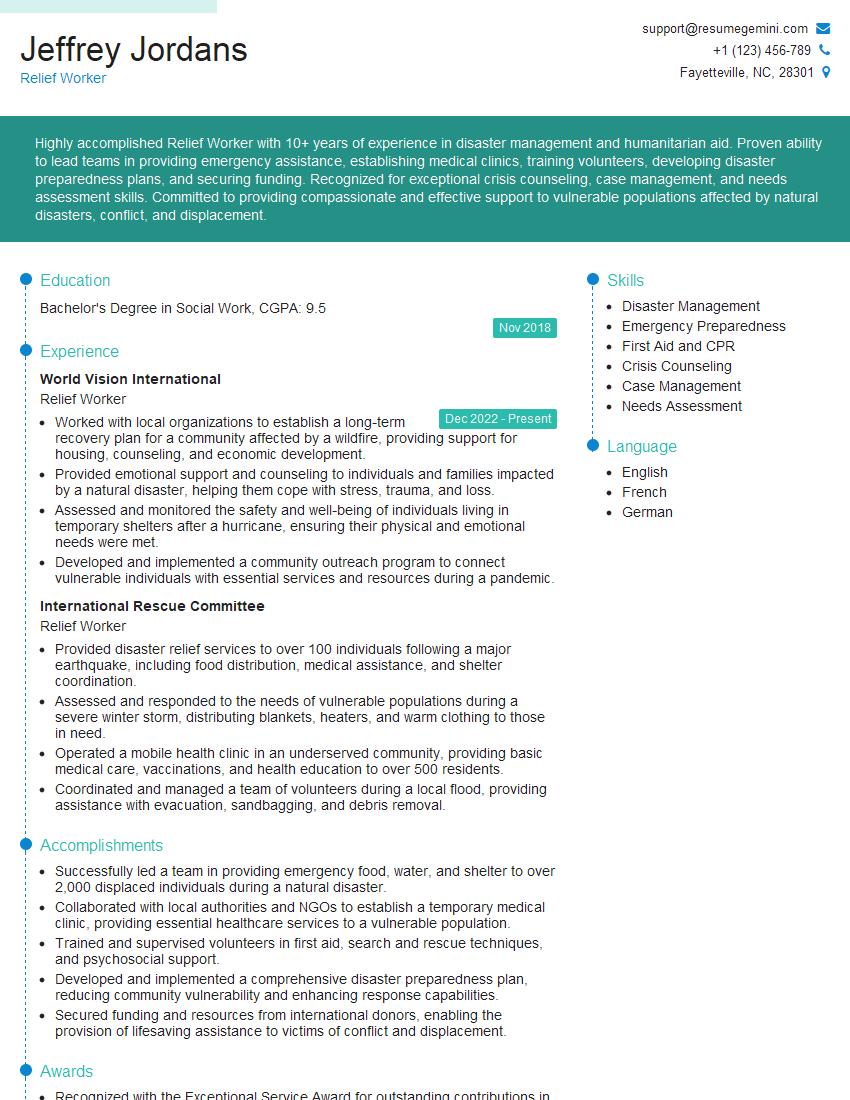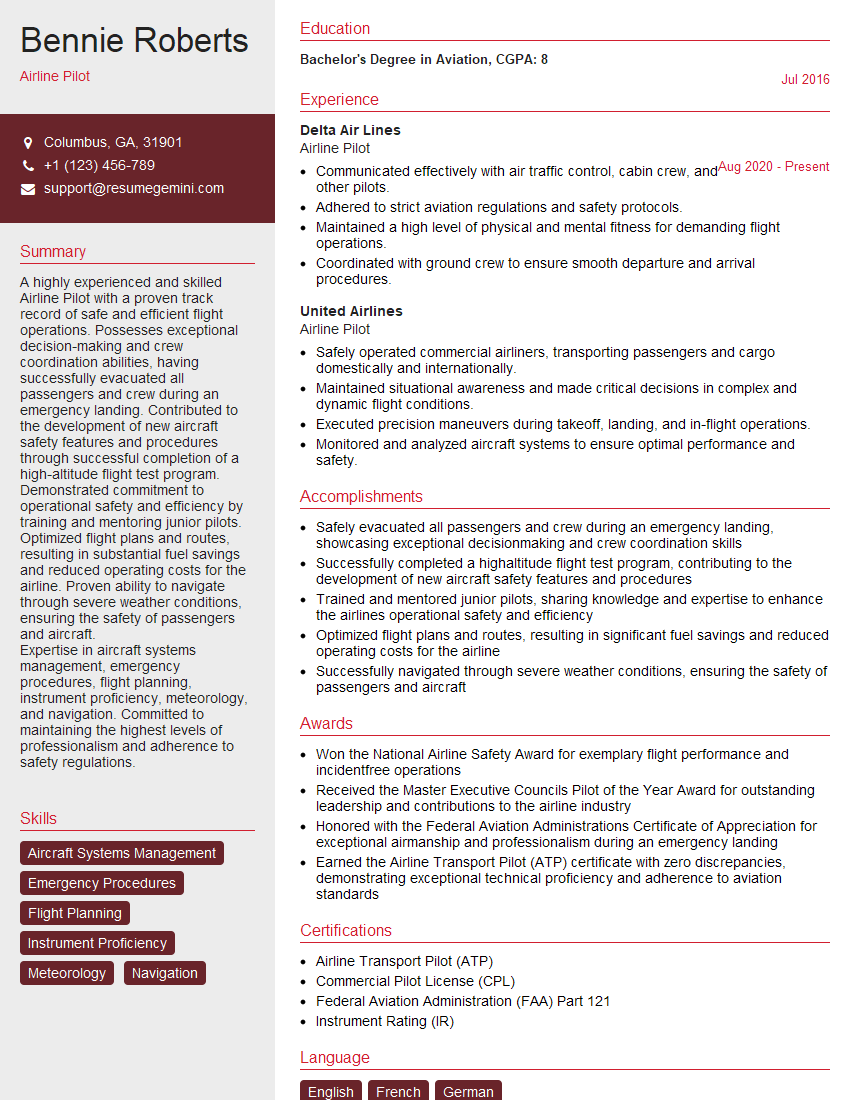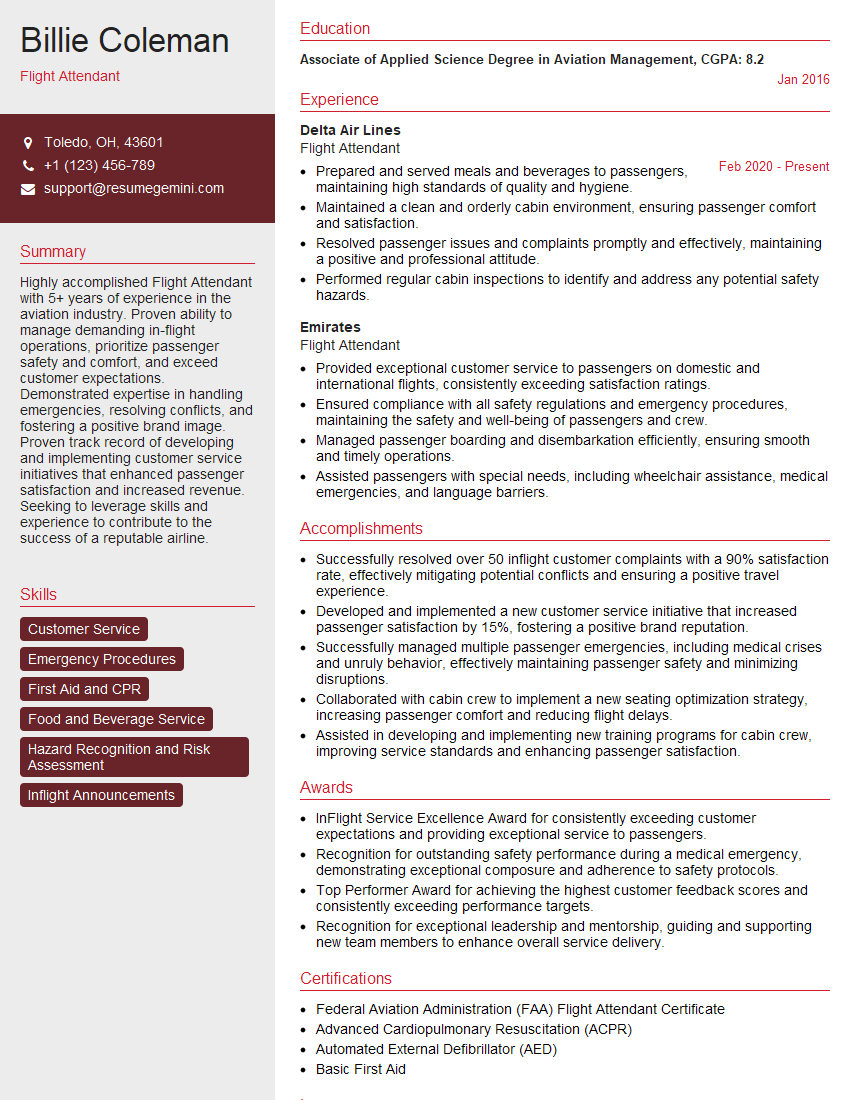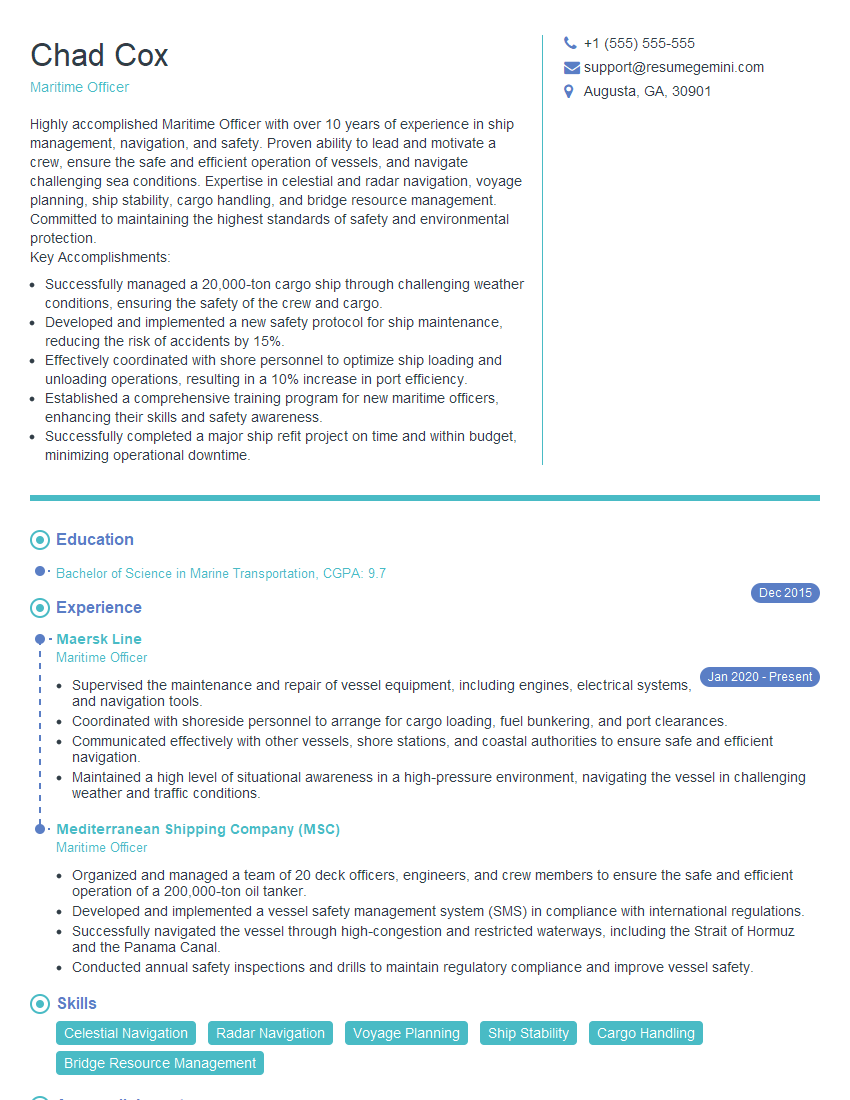Are you ready to stand out in your next interview? Understanding and preparing for Willingness to Travel for Extended Periods interview questions is a game-changer. In this blog, we’ve compiled key questions and expert advice to help you showcase your skills with confidence and precision. Let’s get started on your journey to acing the interview.
Questions Asked in Willingness to Travel for Extended Periods Interview
Q 1. Describe your experience with extended stays away from home.
My experience with extended stays away from home is extensive, encompassing both professional research trips and personal adventures. I’ve lived and worked in diverse environments, ranging from bustling metropolises to remote rural settings. This has equipped me with a deep understanding of the challenges and rewards associated with long-term travel and the intricacies of adapting to unfamiliar cultures and environments. I’ve found that the key to success lies in meticulous planning, adaptability, and a strong sense of self-reliance.
- Professional: I spent six months conducting fieldwork in the Amazon rainforest, requiring significant adaptation to a drastically different lifestyle and reliance on local communities.
- Personal: A three-month backpacking trip across Southeast Asia provided invaluable insights into cultural nuances and the art of navigating unexpected situations.
Q 2. What is the longest period you’ve spent traveling or living abroad?
The longest period I’ve spent traveling or living abroad was 18 months. This involved a combination of research projects and personal travel across South America. During this time, I not only immersed myself in different cultures but also learned to manage logistics, finances, and unexpected challenges independently.
Q 3. How do you manage homesickness or culture shock while traveling for extended periods?
Homesickness and culture shock are inevitable aspects of extended travel. Managing them requires proactive strategies. I find that maintaining regular contact with loved ones through video calls and consistent communication is crucial in mitigating homesickness. To combat culture shock, I focus on actively engaging with the local culture – learning basic phrases, trying local foods, and participating in local activities. Additionally, creating a routine that incorporates familiar elements – like a specific time for journaling or exercise – helps maintain a sense of normalcy. It’s important to allow yourself time to adjust and acknowledge that these feelings are temporary.
Q 4. Have you ever had to adapt to a new environment quickly? Describe the situation and your response.
During my fieldwork in the Amazon, our research team faced an unexpected setback when our primary mode of transportation malfunctioned in a remote area. We had to quickly adapt by utilizing alternative transportation methods, coordinating with local guides, and adjusting our research schedule. My response involved calmly assessing the situation, collaborating with my team, and creatively finding solutions. We successfully navigated the challenge, showcasing our adaptability and resourcefulness.
Q 5. How do you maintain your physical and mental health during extended travel?
Maintaining physical and mental health during extended travel is paramount. I prioritize regular exercise, even if it’s just a daily walk or yoga session. I also ensure I eat nutritious foods, adapting my diet to local options when possible. Mental wellbeing is equally important. I dedicate time to mindfulness practices, journaling, and connecting with nature. I’m also mindful of setting realistic expectations and incorporating rest days to avoid burnout. Remember, self-care is not a luxury, but a necessity.
Q 6. How do you stay connected with loved ones while traveling?
Staying connected with loved ones while traveling relies heavily on technology. Regular video calls, messaging apps, and social media updates are all invaluable tools. I also make an effort to send postcards or small gifts to show I’m thinking of them. Scheduling regular calls, even if just for a short time, provides a vital link to home and helps reduce feelings of isolation. Remember, the quality of communication, not just the frequency, matters.
Q 7. What are your strategies for managing finances while traveling extensively?
Managing finances during extended travel requires meticulous planning and discipline. I create a detailed budget before embarking on a trip, allocating funds for accommodation, transportation, activities, and emergencies. I utilize budgeting apps to track expenses, and I prioritize using cost-effective transportation options and seeking out affordable accommodation. I also explore ways to earn money remotely when possible. Transparency and tracking are key to avoiding financial difficulties.
Q 8. How do you handle unexpected issues or challenges while traveling?
Unexpected issues are inevitable when traveling extensively. My approach involves proactive planning and a flexible mindset. Before any trip, I meticulously research potential problems – from visa requirements and local customs to health advisories and emergency contact information. This preemptive research significantly reduces surprises. However, when unforeseen challenges arise, I prioritize a calm and methodical response. I break down the problem into manageable steps, assessing the situation, identifying available resources (both local and those I can access remotely), and then prioritizing solutions. For example, if I experienced a sudden illness in a remote location, my first steps would be to find local medical assistance, contact my emergency contacts, and inform my employer. This systematic approach ensures I handle situations efficiently and effectively, minimizing disruption to my work and personal wellbeing.
Q 9. Describe a time you had to solve a problem independently while in a foreign country.
During a research trip to rural Nepal, I faced a significant language barrier when attempting to arrange transportation to a remote village. My pre-planned route was impassable due to unexpected landslides. While I had a basic grasp of Nepali, it wasn’t sufficient for complex negotiations. I overcame this by leveraging my smartphone. I used a translation app to communicate with local villagers, showing them pictures of my intended destination and using hand gestures to clarify my needs. I also used the phone’s GPS to show alternative routes. This eventually led me to a local who, although he didn’t speak English, understood my predicament and helped me arrange alternative transport, ultimately ensuring I reached my research site.
Q 10. How do you adapt to different work cultures and communication styles?
Adapting to different work cultures requires cultural sensitivity and active listening. Before embarking on international assignments, I thoroughly research the specific cultural norms and communication styles of the region. This includes understanding hierarchies, preferred communication channels (formal vs. informal), and typical meeting etiquette. For example, in some cultures, direct confrontation is considered rude, while in others, it’s expected. I adjust my approach accordingly, choosing communication styles that foster collaboration and understanding. I’m a strong believer in active listening – paying close attention, asking clarifying questions, and summarizing to ensure mutual understanding. I also focus on building rapport through informal interactions, demonstrating genuine interest in the local culture and seeking to understand perspectives different from my own. This proactive approach enables me to integrate seamlessly into new work environments.
Q 11. How proficient are you in any foreign languages? How has this helped you in travel situations?
I am proficient in Spanish and have a working knowledge of French. My Spanish proficiency has been incredibly valuable during travels throughout Latin America. It has allowed me to engage more meaningfully with locals, navigate unfamiliar situations with greater confidence, and even access information or services that might otherwise have been unavailable. For example, in less tourist-heavy areas, my Spanish enabled me to negotiate prices more effectively, find accommodation outside of typical tourist hubs, and even participate in more authentic cultural experiences. Having a basic command of another language significantly enhances both the professional and personal aspects of extended travel. It allows for deeper cultural immersion and fosters genuine connections.
Q 12. Describe your experience with international travel documentation and visas.
I have extensive experience with international travel documentation and visas. I understand the intricacies of various visa applications, including the required paperwork, processing times, and potential complexities. I meticulously manage my passport, ensuring it remains valid well beyond my intended travel dates. I typically begin the visa application process well in advance, allowing ample time to address any potential delays. I also maintain digital copies of all my travel documents, including passport scans and visa approvals, as a backup measure. I am also familiar with different entry requirements, such as health declarations and customs regulations, and proactively prepare all necessary documentation to ensure a smooth travel experience.
Q 13. How comfortable are you with independent travel and navigating unfamiliar environments?
I am highly comfortable with independent travel and navigating unfamiliar environments. I am confident in utilizing various navigation tools, including GPS apps and maps, to find my way. Before traveling to a new location, I typically research transportation options, potential safety concerns, and recommended routes. I’m also adept at using public transportation systems, understanding local customs and etiquette related to transit. My comfort with independent travel stems from a combination of experience, planning, and an open and adaptable mindset. I embrace the opportunity to explore new environments and am comfortable adapting to unexpected situations or changes of plans. I view navigating unfamiliar environments as an enriching part of the travel experience.
Q 14. How well do you handle jet lag or other travel-related fatigue?
Managing jet lag and travel fatigue is crucial for maintaining productivity during extended travel. My strategy involves proactively adjusting my sleep schedule in the days leading up to a long flight, gradually shifting my bedtime to align with the destination’s time zone. Upon arrival, I prioritize getting exposure to sunlight to regulate my circadian rhythm and I stick to a consistent sleep and wake schedule as much as possible, even if I’m only in a place for a short period. I avoid excessive caffeine and alcohol before bed and stay hydrated. I also incorporate regular exercise to help combat fatigue. When necessary, I may utilize melatonin or other supplements to aid sleep, always consulting with a healthcare professional before doing so. Prioritizing rest and self-care is essential for ensuring both physical and mental well-being throughout extended travel periods.
Q 15. What safety precautions do you take while traveling in unfamiliar locations?
Safety is paramount when traveling to unfamiliar locations. My approach is multifaceted and proactive, encompassing pre-trip planning and on-the-ground vigilance.
- Pre-Trip Planning: I meticulously research my destination, including local laws, customs, and potential risks. This involves consulting travel advisories from my government and reputable organizations, researching safe neighborhoods and transportation options, and learning basic local phrases for emergencies. I share my itinerary with trusted contacts and register my travel plans with relevant authorities where applicable. I also make copies of important documents, such as my passport and visas, and store them separately from the originals.
- On-the-Ground Vigilance: I avoid displaying expensive jewelry or electronics and am aware of my surroundings at all times. I use reputable transportation services and avoid walking alone at night in unfamiliar areas. I keep emergency contact information readily accessible and have a well-charged phone with international roaming enabled. I’m familiar with local emergency services numbers and know how to access consular assistance if needed. I also prioritize staying in well-reviewed accommodations with appropriate security measures.
For example, during a recent trip to a less-touristic region in Southeast Asia, I took a local language course before my departure and invested in a reliable local SIM card for easy communication. I also carefully researched local customs regarding dress and interaction with locals to avoid any unintentional offense or misunderstanding. This proactive approach significantly enhanced my safety and overall experience.
Career Expert Tips:
- Ace those interviews! Prepare effectively by reviewing the Top 50 Most Common Interview Questions on ResumeGemini.
- Navigate your job search with confidence! Explore a wide range of Career Tips on ResumeGemini. Learn about common challenges and recommendations to overcome them.
- Craft the perfect resume! Master the Art of Resume Writing with ResumeGemini’s guide. Showcase your unique qualifications and achievements effectively.
- Don’t miss out on holiday savings! Build your dream resume with ResumeGemini’s ATS optimized templates.
Q 16. Have you worked in a remote or isolated location before? Describe your experience.
Yes, I have extensive experience working in remote locations. During a six-month research project in the Amazon rainforest, I was based in a small, isolated research station accessible only by boat. This experience was incredibly challenging but also incredibly rewarding.
The biggest challenge was the lack of readily available resources. We had limited internet access, unreliable electricity, and very basic medical facilities. This meant careful planning and resource management were crucial. We had to meticulously plan our supply runs and develop contingency plans for unexpected issues. For example, we had to rely on satellite phones for emergency communication and had a detailed medical protocol in place for common jungle ailments. Despite these challenges, the immersive experience fostered resilience, adaptability, and problem-solving skills that are invaluable in any remote work setting. The sense of community among the team was also exceptionally strong; we relied heavily on each other for support and collaboration.
Q 17. Are you comfortable working independently with minimal supervision while traveling?
Absolutely. I thrive in environments that demand self-reliance and initiative. My experience in remote research and fieldwork has honed my ability to work independently and manage my time effectively with minimal supervision. I’m adept at prioritizing tasks, setting realistic goals, and proactively seeking solutions to challenges without constant oversight. I believe strong self-management skills are essential for success in extended travel work arrangements and I possess a well-established system for tracking progress, managing deadlines, and maintaining consistent communication with my supervisors, even with limited connectivity.
Q 18. How do you maintain your productivity while traveling and working?
Maintaining productivity while traveling requires a structured approach and discipline. I utilize several strategies to maximize efficiency:
- Structured Daily Routine: I establish a consistent daily schedule, even when in unfamiliar locations. This includes dedicated work blocks, breaks, and personal time. Consistency anchors my productivity and minimizes distractions.
- Technology & Tools: I rely heavily on technology – cloud-based storage for documents, project management software, video conferencing tools, and noise-canceling headphones. These tools help me stay connected and organized.
- Adaptable Workspace: I choose my workspaces carefully. It might be a café with reliable wifi, a quiet hotel room, or a co-working space, depending on the location and task at hand. Adaptability is key.
- Mindfulness & Breaks: Regular breaks and mindfulness practices help combat fatigue and maintain focus. Integrating physical activity into my daily routine further enhances productivity.
For example, when working remotely in a bustling city, I might schedule my most focused work tasks for early mornings before the city wakes up. Similarly, if I’m in a quieter location, I might leverage the peaceful atmosphere for tasks requiring deep concentration.
Q 19. How would you handle a significant delay or disruption to your travel plans?
Handling significant travel disruptions requires a calm, proactive approach. My response would be based on a risk assessment and mitigation strategy.
- Immediate Assessment: I’d assess the impact of the delay or disruption on my work schedule and deadlines. Is it a minor setback or a significant roadblock?
- Communication: I’d immediately inform my supervisors and stakeholders of the situation and propose alternative solutions, for example, working remotely from an alternative location or adjusting my schedule.
- Contingency Planning: I always have backup plans in place – alternative routes, accommodation options, and communication channels. Having these contingencies allows for flexibility and minimizes disruption.
- Problem Solving: I would actively seek solutions – contacting airlines or transportation providers for assistance, researching alternative travel options, or exploring virtual collaboration tools to maintain work flow.
During a recent project, a volcanic eruption caused flight cancellations. I immediately contacted my supervisors and proposed working remotely from a nearby city with reliable internet access. The proactive communication and swift adaptation prevented any project delays.
Q 20. Are you prepared to accept temporary or limited access to certain comforts or conveniences?
Yes, I am fully prepared for temporary limitations on comforts and conveniences. Extended travel often involves trade-offs, and I’ve learned to prioritize the objectives of my work over personal preferences. This adaptability is crucial for successful extended travel assignments.
I understand that reliable internet, comfortable accommodations, and readily available amenities might not always be accessible, and I’m prepared to adjust my expectations accordingly. My focus remains on successfully completing my tasks and maintaining a productive workflow. For example, I’ve happily adapted to working from less-than-ideal conditions – a shared workspace with limited privacy, less-than-comfortable accommodations, or intermittent internet access. These situations only reinforce my resilience and problem-solving skills.
Q 21. How do you ensure you comply with all health and safety regulations when working abroad?
Compliance with health and safety regulations is non-negotiable. My approach is proactive and comprehensive.
- Pre-Trip Research: I thoroughly research health and safety requirements for the specific country or region I’m visiting. This includes visa requirements, necessary vaccinations, and any specific safety guidelines relevant to my work.
- Documentation & Permits: I obtain all necessary permits, licenses, and documentation required for my work and travel. I carry all relevant paperwork with me.
- Health Precautions: I consult my physician for recommended vaccinations and necessary precautions. I maintain health insurance with international coverage.
- On-the-Ground Awareness: I am mindful of local safety guidelines and regulations throughout my assignment. I take appropriate precautions to avoid risks and hazards related to the work environment and the local context.
For instance, before a recent research project in Africa, I consulted with a travel medicine specialist to ensure I had all the necessary vaccinations and medications. I also researched local safety precautions related to wildlife and environmental hazards and followed guidelines provided by the research organization. Proactive attention to these details ensures both my safety and the compliance of my work.
Q 22. What are your expectations regarding accommodation and living conditions during extended travel?
My expectations regarding accommodation during extended travel are pragmatic and prioritize functionality and safety. I don’t need luxury, but I do need a reliable and comfortable place to rest and recharge. This means clean, safe lodging with access to essential amenities like reliable internet, a comfortable bed, and a workspace. The specific needs might vary depending on the location and duration of the stay. For example, in a remote location, I’d prioritize safety and access to basic necessities over luxury features. In a major city, access to reliable transport links might be a higher priority than a large living space. In essence, my accommodation needs are geared towards optimizing productivity and well-being while traveling.
Regarding living conditions, I strive for a balance between comfort and adaptability. I’m prepared for variations in local customs and standards. For instance, I understand that living standards may differ significantly between developed and developing countries, and I’m adaptable to those differences. I prioritize hygiene and safety above all, and I’m always prepared to take necessary precautions to ensure a safe and comfortable stay. I also research the local culture beforehand to avoid potential misunderstandings or discomfort.
Q 23. How do you balance work responsibilities with personal time while traveling extensively?
Balancing work and personal time while traveling extensively requires meticulous planning and strong self-discipline. I utilize time blocking techniques, scheduling specific time slots for work and dedicating others to personal activities and exploration. For example, I might dedicate mornings to focused work, afternoons to meetings, and evenings to exploring the local culture. This structured approach minimizes distractions and ensures that both work and leisure time are given appropriate attention.
Furthermore, I leverage technology to my advantage. Tools like calendar applications with reminders and time zone converters help manage my schedule across multiple time zones. I also set clear boundaries, ensuring that I switch off from work during designated personal time to avoid burnout. Finally, incorporating physical activity and mindfulness practices into my routine helps maintain a healthy work-life balance even amidst the challenges of extensive travel.
Q 24. What is your preferred method of communication while traveling (email, phone, etc.)?
My preferred method of communication while traveling depends heavily on the context. For routine updates and less urgent matters, email is efficient and reliable. For time-sensitive issues or those requiring immediate clarification, I favor instant messaging platforms like Slack or WhatsApp for quick responses. Phone calls are reserved for more complex or sensitive discussions where nuanced communication is vital. I also utilize video conferencing for team meetings and collaborations to maintain a sense of connection and facilitate seamless teamwork. The key is to choose the communication tool that best suits the urgency and nature of the communication.
Q 25. How do you keep abreast of current events and any changes in regulations or procedures impacting your work while abroad?
Staying abreast of current events and regulatory changes while abroad requires a multi-pronged approach. I subscribe to reputable news sources and utilize official government websites to monitor any updates affecting my work or travel plans. I also actively engage with local contacts and colleagues who can provide up-to-the-minute insights into specific situations. Furthermore, I ensure my company’s internal communication channels are actively monitored for any internal announcements or alerts. This layered approach minimizes the risk of missing crucial information and helps me proactively adapt to unforeseen circumstances.
Q 26. Describe a situation where you had to overcome a logistical challenge while traveling for work.
During a project in rural South America, we encountered unexpected road closures due to severe weather. Our scheduled site visit was jeopardized. To overcome this, I collaborated with local contacts to explore alternative routes and transportation options. We ultimately chartered a smaller, all-terrain vehicle, which allowed us to reach the site with only a minor delay. This required flexibility, resourcefulness, and quick decision-making, which are essential skills for anyone working in an international context. The experience highlighted the value of having a strong local network and the importance of being adaptable and resourceful in unexpected situations. Prioritizing communication and teamwork proved invaluable in finding a solution.
Q 27. How do you prioritize your tasks when working in a time zone significantly different from your home base?
Prioritizing tasks across vastly different time zones requires a clear understanding of deadlines and stakeholder expectations. I utilize project management tools to visualize task dependencies and deadlines, ensuring alignment with different time zones. I typically begin my day by prioritizing tasks that require immediate attention from colleagues in my home base time zone. Then, I schedule tasks that can be completed independently or asynchronously, leaving more flexible time for communication with teams in other time zones. I also make sure to incorporate buffer time into my schedule to handle any unexpected delays or urgent requests that may arise from different time zones.
Q 28. Describe your experience with using different technologies and communication platforms while working remotely.
My experience with various technologies and communication platforms while working remotely has been overwhelmingly positive. I’m proficient in using project management software such as Asana and Trello for efficient task management and collaboration. Video conferencing tools like Zoom and Google Meet are integral for maintaining real-time interaction with teams. Cloud storage services like Dropbox and Google Drive facilitate seamless file sharing and access irrespective of location. I’m comfortable using VPNs (Virtual Private Networks) to maintain secure connections and adhering to company security protocols while working on various networks. The successful integration of these technologies has been crucial for maintaining productivity and collaboration despite geographical distances.
Key Topics to Learn for Willingness to Travel for Extended Periods Interview
- Defining Your Travel Boundaries: Understanding your personal limits regarding duration and location types. Consider factors like family commitments, preferred climates, and desired levels of cultural immersion.
- Practical Considerations: Discussing logistical aspects such as visa requirements, accommodation options, health insurance, and personal safety. Demonstrate your proactive approach to planning and problem-solving.
- Adaptability and Resilience: Highlighting your ability to adjust to new environments, cultures, and working styles. Showcase instances where you’ve successfully overcome challenges while traveling or working remotely.
- Communication and Collaboration: Emphasizing your communication skills, particularly in cross-cultural contexts. Illustrate how you maintain effective teamwork while working remotely or across time zones.
- Time Management and Productivity: Demonstrating your ability to manage your time effectively in diverse and potentially unpredictable environments. Show how you maintain productivity while traveling.
- Financial Planning: Briefly discussing your understanding of budgeting and managing finances while away from home for extended periods.
- Cultural Sensitivity and Awareness: Showcasing your respect for diverse cultures and your ability to navigate cultural differences professionally and respectfully.
Next Steps
Mastering your communication around Willingness to Travel for Extended Periods significantly broadens your career opportunities, opening doors to exciting projects and international experiences. An ATS-friendly resume is crucial for getting your application noticed by recruiters. To build a compelling resume that highlights your adaptability and global readiness, leverage the power of ResumeGemini. ResumeGemini provides you with the tools and resources to craft a professional resume, showcasing your readiness for extended travel assignments. Examples of resumes tailored to highlight Willingness to Travel for Extended Periods are available within the ResumeGemini platform.
Explore more articles
Users Rating of Our Blogs
Share Your Experience
We value your feedback! Please rate our content and share your thoughts (optional).
What Readers Say About Our Blog
This was kind of a unique content I found around the specialized skills. Very helpful questions and good detailed answers.
Very Helpful blog, thank you Interviewgemini team.
